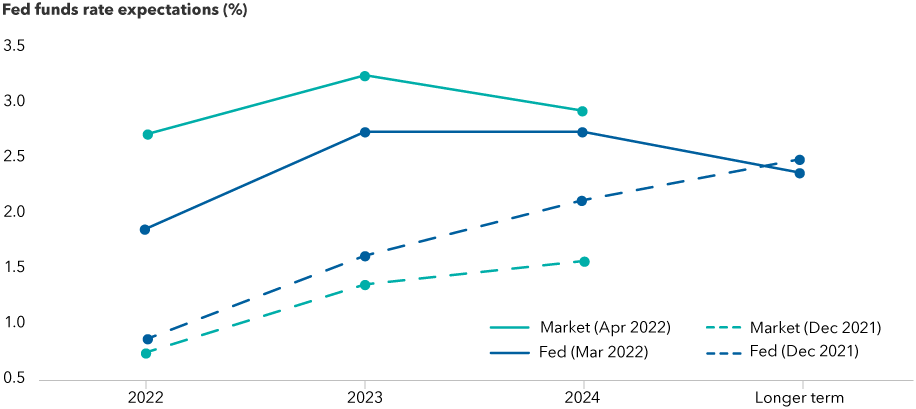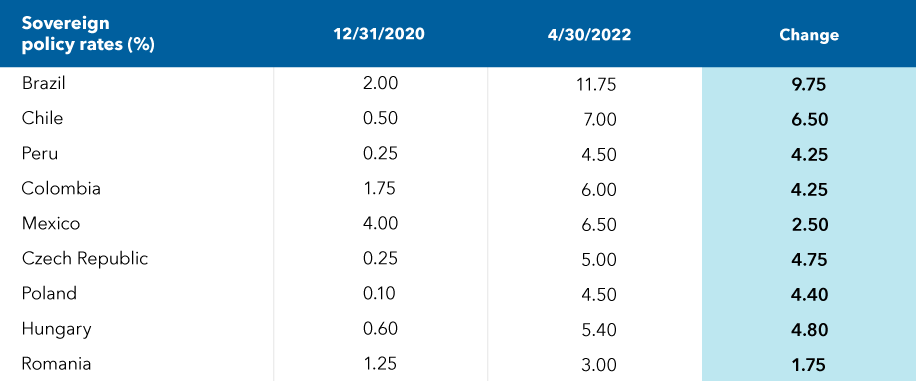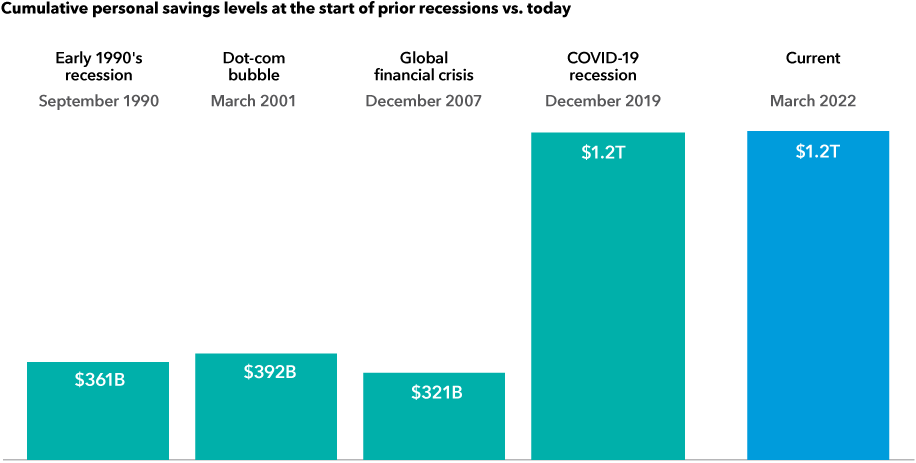Market Volatility
Bonds
Markets are on edge over soaring consumer prices, the war in Ukraine and recession fears in the U.S., Europe and China.
The Bloomberg U.S. Aggregate Bond Index, a broad representation of the U.S. bond market, declined 5.9% in U.S. dollars in the first quarter, the worst quarterly loss since 1980. In April, it was down another 3.8%. With bond returns battered, investors may be wondering if there are any bargains in fixed income markets. Given the low prices, is now a good time to buy?
The risks are real. The U.S. Federal Reserve’s efforts to contain inflation are likely to pressure growth and employment in the near term as its outlook remains hawkish.
Rate hike expectations have jumped

Sources: Bloomberg, Federal Open Market Committee. Projections assume rate at year-end.
And as Europe seeks to wean itself from Russian oil and gas, energy prices — up 38% year-to-date — may remain elevated.
Against this challenging backdrop, three of our fixed income portfolio managers with Capital Group Multi-Sector Income FundTM (Canada) offer their views about what’s ahead for some of the riskier bond market sectors. (Multi-Sector Income is available to investors as of June 30, 2022.)
Companies are benefiting from consumer demand, but expect a more volatile environment for credit
Damien McCann, fixed income portfolio manager
The Fed seems intent on trying to slow economic activity. Rate hikes tend to impact economic activity with a lag of at least two quarters. Right now, corporate fundamentals are fairly strong, and companies are benefiting from a consumer that is able to withstand price increases. I am seeing early indications that lower income consumers are spending less, but overall, there is no significant pullback.
Inflation is a major concern, and Russia’s invasion of Ukraine has only added fuel to the fire. The economic toll of the invasion has far-reaching effects that are not yet fully visible. Obviously there has been an impact on the energy and grain sectors, but it has also spilled into certain parts of auto manufacturing and industrial gasses the semiconductor industry relies on.
Food and autos are more exposed to higher input costs and shortages compared to telecom and cable, or health care companies.
Spreads have widened over the past year, and it is a more volatile environment for credit. The issuance of high-yield bonds has dropped dramatically as companies wait for things to settle down.
As an active manager, I have the flexibility to react to these ongoing shifts.
The returns across investment grade, high yield, emerging markets and securitized debt are not the same over time. Being flexible and adjusting your portfolio can help buffer some of the current headwinds. There have been more opportunities in investment-grade bonds over the past few months, but I still think high-yield bonds offer better value.
Within investment-grade corporates, certain California-based utilities seem attractive. In high yield, energy companies have some upside. In my view, oil prices will stay fairly high as supply is likely to remain tight. Beyond Russia, U.S. energy companies have a labour shortage problem which will limit increases in drilling activity. People in West Texas can work remotely and earn the same wage as if they were working on an oil rig.
Among high-yield credits, I also see value in insurance brokerage and financial advisory issuers. These are resilient business models that can withstand high leverage.
Valuations and fundamentals suggest cautious optimism for emerging markets
Kirstie Spence, fixed income portfolio manager
What’s happening in Ukraine is heartbreaking. I’ve dealt with many crises in my 25-plus years of investing in emerging markets, and this one is uncharted territory on so many levels.
I think it’s prudent to stay cautious given the heightened volatility from war, inflation and the slowdown in China. However, there are idiosyncratic opportunities in emerging markets debt that an active manager can pursue.
Bonds across many emerging markets have traded lower, but some of that trading has been related to risks tied to inflation and what central banks are doing. The asset class has matured significantly over the past decade. I think valuations generally reflect some downside risks.
Overall, fundamentals are fairly decent. Several emerging markets banks have raised rates dramatically to combat inflation. And in some markets like Brazil, investors are being fairly compensated for elevated inflation. I also think certain currencies may even be cheap by historical standards.
There are bright spots. Commodity exporters such as certain Latin American-based countries have traded higher, as surging prices could help them withstand a slowdown in global growth.
Proactive rate hikes could provide attractive entry points for some emerging markets

Source: Bloomberg. Data shown as of 4/30/2022.
Securitized assets may be more resilient compared to other bond sectors as inflation and rates rise
Xavier Goss, fixed income portfolio manager
Securitized assets cover a wide gamut of sectors such as U.S. residential mortgages, auto loans, commercial real estate and student loans. Broadly speaking, asset-backed securities and commercial mortgaged-back securities have some upside even with higher inflation. Select areas appear attractive compared to corporate credit, particularly at current spread levels.
I remain a bit cautious as tighter monetary policy will slow growth and loan demand. That will flow through and impact consumer spending. I expect an uptick in delinquencies and defaults as eviction moratoriums and other pandemic-era programs roll off. While the increase could be higher than pre-pandemic levels, it shouldn’t be exceptionally so because consumers are in a better financial position today as compared to past financial crises.
Consumers in the U.S. may be better prepared to weather an economic slowdown

Sources: Capital Group, Federal Reserve Bank of St. Louis, National Bureau of Economic Analysis, Refinitiv Datastream. Personal savings figures are seasonally adjusted and released quarterly. All prices shown in USD.
I have been spending more time meeting with loan originators to better understand their specific underwriting standards. As financial conditions tighten, there may be a bifurcation in deal performance as weaker originators loosen their underwriting standards to maintain current loan volume.
In the current environment, I foresee more bespoke and privately negotiated transactions across the securitized space, particularly as security selection becomes a more prominent driver of returns. This is especially relevant in the consumer asset-backed securities market where there are more niche issuers.
Lower rated bonds are subject to greater fluctuations in value and risk of loss of income and principal than higher rated bonds.
The use of derivatives involves a variety of risks, which may be different from, or greater than, the risks associated with investing in traditional securities, such as stocks and bonds.
Bloomberg U.S. Aggregate Bond Index represents the U.S. investment-grade fixed-rate bond market. The index is unmanaged and, therefore, has no expenses. Investors cannot invest directly in an index.
Our latest insights
-
-
Market Volatility
-
Markets & Economy
-
-
Market Volatility
RELATED INSIGHTS
-
Market Volatility
-
Market Volatility
-
Commissions, trailing commissions, management fees and expenses all may be associated with investments in investment funds. Please read the prospectus before investing. Investment funds are not guaranteed or covered by the Canada Deposit Insurance Corporation or by any other government deposit insurer. For investment funds other than money market funds, their values change frequently. For money market funds, there can be no assurances that the fund will be able to maintain its net asset value per security at a constant amount or that the full amount of your investment in the fund will be returned to you. Past performance may not be repeated.
Unless otherwise indicated, the investment professionals featured do not manage Capital Group‘s Canadian investment funds.
References to particular companies or securities, if any, are included for informational or illustrative purposes only and should not be considered as an endorsement by Capital Group. Views expressed regarding a particular company, security, industry or market sector should not be considered an indication of trading intent of any investment funds or current holdings of any investment funds. These views should not be considered as investment advice nor should they be considered a recommendation to buy or sell.
Statements attributed to an individual represent the opinions of that individual as of the date published and do not necessarily reflect the opinions of Capital Group or its affiliates. This information is intended to highlight issues and not be comprehensive or to provide advice. For informational purposes only; not intended to provide tax, legal or financial advice. Capital Group funds are available in Canada through registered dealers. For more information, please consult your financial and tax advisors for your individual situation.
Forward-looking statements are not guarantees of future performance, and actual events and results could differ materially from those expressed or implied in any forward-looking statements made herein. We encourage you to consider these and other factors carefully before making any investment decisions and we urge you to avoid placing undue reliance on forward-looking statements.
The S&P 500 Composite Index (“Index”) is a product of S&P Dow Jones Indices LLC and/or its affiliates and has been licensed for use by Capital Group. Copyright © 2025 S&P Dow Jones Indices LLC, a division of S&P Global, and/or its affiliates. All rights reserved. Redistribution or reproduction in whole or in part are prohibited without written permission of S&P Dow Jones Indices LLC.
FTSE source: London Stock Exchange Group plc and its group undertakings (collectively, the "LSE Group"). © LSE Group 2025. FTSE Russell is a trading name of certain of the LSE Group companies. "FTSE®" is a trade mark of the relevant LSE Group companies and is used by any other LSE Group company under licence. All rights in the FTSE Russell indices or data vest in the relevant LSE Group company which owns the index or the data. Neither LSE Group nor its licensors accept any liability for any errors or omissions in the indices or data and no party may rely on any indices or data contained in this communication. No further distribution of data from the LSE Group is permitted without the relevant LSE Group company's express written consent. The LSE Group does not promote, sponsor or endorse the content of this communication. The index is unmanaged and cannot be invested in directly.
BLOOMBERG® is a trademark and service mark of Bloomberg Finance L.P. and its affiliates (collectively “Bloomberg”). Bloomberg or Bloomberg’s licensors own all proprietary rights in the Bloomberg Indices. Neither Bloomberg nor Bloomberg’s licensors approves or endorses this material, or guarantees the accuracy or completeness of any information herein, or makes any warranty, express or implied, as to the results to be obtained therefrom and, to the maximum extent allowed by law, neither shall have any liability or responsibility for injury or damages arising in connection therewith.
MSCI does not approve, review or produce reports published on this site, makes no express or implied warranties or representations and is not liable whatsoever for any data represented. You may not redistribute MSCI data or use it as a basis for other indices or investment products.
Capital believes the software and information from FactSet to be reliable. However, Capital cannot be responsible for inaccuracies, incomplete information or updating of the information furnished by FactSet. The information provided in this report is meant to give you an approximate account of the fund/manager's characteristics for the specified date. This information is not indicative of future Capital investment decisions and is not used as part of our investment decision-making process.
Indices are unmanaged and cannot be invested in directly. Returns represent past performance, are not a guarantee of future performance, and are not indicative of any specific investment.
All Capital Group trademarks are owned by The Capital Group Companies, Inc. or an affiliated company in Canada, the U.S. and other countries. All other company names mentioned are the property of their respective companies.
Capital Group funds are offered in Canada by Capital International Asset Management (Canada), Inc., part of Capital Group, a global investment management firm originating in Los Angeles, California in 1931. Capital Group manages equity assets through three investment groups. These groups make investment and proxy voting decisions independently. Fixed income investment professionals provide fixed income research and investment management across the Capital organization; however, for securities with equity characteristics, they act solely on behalf of one of the three equity investment groups.
The Capital Group funds offered on this website are available only to Canadian residents.
 Damien McCann
Damien McCann
 Kirstie Spence
Kirstie Spence
 Xavier Goss
Xavier Goss